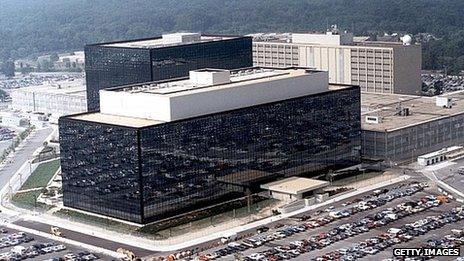NSA leaks: Snowden declares 'mission accomplished'
- Published
Edward Snowden will deliver a Christmas message, as Simeon Paterson reports
Former National Security Agency (NSA) contractor Edward Snowden, who leaked details of US electronic surveillance programmes, says he achieved his aim.
"In terms of personal satisfaction, the mission's already accomplished," he told the Washington Post, external.
"I already won," said Mr Snowden, whose extensive leaks have caused a reassessment of US surveillance policy.
The 30-year-old was interviewed in Russia, where he was granted temporary asylum on 1 August.
Mr Snowden fled the US in late May, taking a huge cache of secret documents with him. He faces espionage charges in the US.
"As soon as the journalists were able to work, everything that I had been trying to do was validated. Because, remember, I didn't want to change society. I wanted to give society a chance to determine if it should change itself," he told the newspaper.
"All I wanted was for the public to be able to have a say in how they are governed," Mr Snowden said.
Last week, a federal judge declared the mass collection of telephone data unconstitutional and a presidential advisory panel suggested reforms.
Both the judge and the panel said there was little evidence that any terrorist plot had been thwarted by the programme.
A few days later, in his end-of-year news conference, US President Barack Obama suggested there might be a review of surveillance by the NSA.
In light of "disclosures that have taken place" and public concerns about the programmes, there might be "another way of skinning the cat", he said.
However, he accused Mr Snowden of causing "unnecessary damage" by leaking documents.
President Obama said he would make a "definitive statement" in January about recommendations by the White House panel.
'Going in blind'
The NSA, accustomed to watching without being watched, faces scrutiny it has not endured since the 1970s, or perhaps ever, the Washington Post reports.
Mr Snowden told the newspaper he had no way of knowing whether the public would share his views.
"You recognise that you're going in blind... But when you weigh that against the alternative, which is not to act, you realise that some analysis is better than no analysis."
Later, the UK's Channel 4 revealed that Mr Snowden would deliver its "Alternative Christmas Message", external on Wednesday - the broadcaster's answer to Queen Elizabeth II's message to the nation.
In his first TV interview since arriving in Moscow, Mr Snowden would talk about "why privacy matters", it said.
"A child born today will grow up with no conception of privacy at all. They'll never know what it means to have a private moment to themselves, an unrecorded, unanalysed thought," he was quoted as saying.
"The conversation occurring today will determine the amount of trust we can place both in the technology that surrounds us and the government that regulates it. Together we can find a better balance, end mass surveillance and remind the government that if it really wants to know how we feel, asking is always cheaper than spying."

The NSA was found to have engaged in large-scale trawling of phone call data
More details of people and institutions targeted by UK and US surveillance were published last week by The Guardian, The New York Times and Der Spiegel.
The papers said the list of about 1,000 targets included an EU commissioner, humanitarian organisations and Israeli officials including a prime minister.
US technology giants including Google, Microsoft and Yahoo are taking steps to block the collection of data by their government.
In October, news that the NSA had monitored the phone of German Chancellor Angela Merkel triggered a diplomatic row between Berlin and Washington.
Brazil's President Dilma Rousseff was also angered by revelations that the NSA had hacked the computer network of Brazil's state-run oil company Petrobras to collect data on emails and telephone calls.